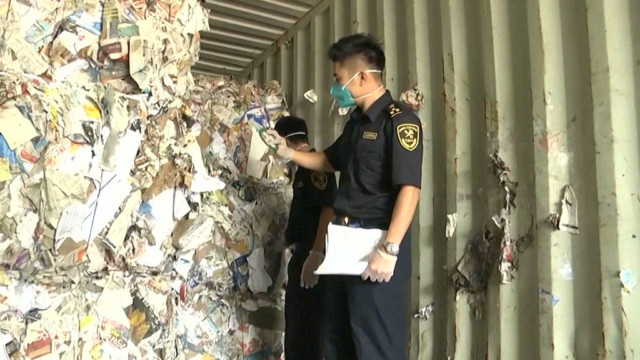For decades, one town in southern China has been one of the world’s biggest dumping grounds.
But, a new government initiative is changing the landscape. And it could help clean the town’s image.
CGTN’s Frances Kuo has more.
Guiyu in southeastern Guangdong Province is known as the world’s electronic wastebasket.
It dismantles an estimated 450,000 tons of electronic trash every year, a lot of it from abroad.
The dirty work is done by thousands of workers like Hu Bamei.
“I think it’s fine for us working here, but it gets hot on warm days,” said Hu.
Weather isn’t the only challenge.
Taking apart items like old computers and mobile phones, by hand, is a tough job.
It also raises environmental concerns like pollution. Now, there’s a new government initiative to clean up.
“China is entering a new era. What we now face is the contradiction between unbalanced and inadequate development and the people’s ever-growing needs for a better life,” said Liu Fenglin of the Guangzhou Environmental Protection Bureau.
At the start of the year, a ban went into effect on the import of 24 types of solid waste, including some plastics and paper.
In Guiyu, hundreds of small, informal recycling operators have been shuttered or consolidated.
“Although the dismantling of old electronic devices is the leading industry in Guiyu, we should say it was more a profession than an industry,” said Zheng Jinxiong, Vice-Chairman of the Recycling Park Commission. “The dismantling of old electronics is not a sunrise industry, but it’s a must-do industry. So the local government had an obligation as well as the ability to lead, standardize and make it scientific.”
Electronic trash is now being directed to an industrial park on the edge of town, so authorities can better monitor environmental, health and safety standards.
“Without garbage from abroad, China will turn to recycling domestic garbage certainly,” said Wang Jingwei, a professor of Shanghai Industrial University. “In the past, no one was dealing with garbage domestically, and domestic garbage could not be properly recycled. So the fundamental purpose (of the ban) is to solve the problem of pollution while encouraging the recycling business to focus on domestic garbage recycling as a resource.”
Beijing said it plans to invest a reported $31 billion in household waste treatment through 2020.
China’s move could help encourage other countries to adopt similar initiatives and clean up their own dumping grounds.
 CGTN America
CGTN America

